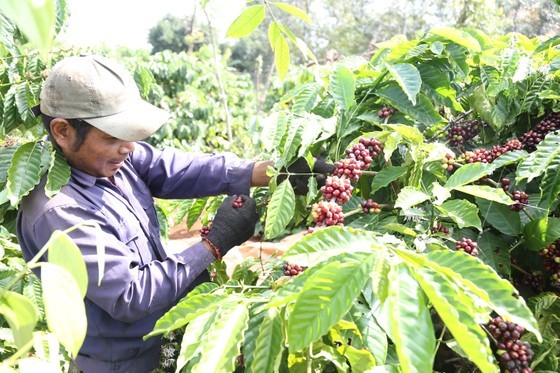 |
Head of the Department of Crop Production Nguyen Nhu Cuong talks about solutions to adapt to new European regulations of imports into the EU of coffee |
To fight climate change and biodiversity loss, the new law obliges companies to ensure that a series of products sold in the EU do not come from deforested land anywhere in the world.
Mr. Cuong said that the European Parliament approved a landmark deforestation law to ban imports into the EU of coffee, beef, soy and other commodities if they are linked to the destruction of the world's forests on May 16, 2023.
In Hanoi, the Ministry of Agriculture and Rural Development, in collaboration with the Delegation of the European Union to Vietnam, on June 29 held a conference to produce and supply agricultural products that do not cause deforestation in accordance with EU regulations.
According to this new regulation, some agricultural products of Vietnam such as wood and forest products, rubber, especially coffee, when exported to the European market, will have to meet the requirements such as geolocation data collection. Producers can use different digital tools to collect geolocation data, including apps that use GPS devices for each garden and drones that can map plots by taking pictures from above.
Assessing the impact of regulations on Vietnam's exports, Mr. Cuong said that wood and wood products, coffee, and rubber are the main export sectors of Vietnam, which may be affected when the regulation applies. In his opinion, the new EU Deforestation Regulation (EUDR) initiative is particularly a challenge for Vietnam's coffee industry, but it is not a big deal. The government fully has mechanisms, policies and technical solutions to respond and adapt to this regulation.
On the contrary, he supposed the new regulations are also an opportunity for Vietnamese coffee to develop sustainably and adapt to the regulations of the world market. Vietnamese coffee has currently met quality requirements.
In the coming time, not only coffee but also many other agricultural products will have to meet new requirements, especially in terms of environment, namely greening and forest protection and sustainable development. Therefore, the countries which are Vietnam's competitors in coffee export may be more affected than Vietnam by the new regulations.
 |
Farmers in the Central Highlands areas harvest coffee |
Answering the question of how to prove that Vietnam’s coffee meets the criterion of no deforestation, Mr. Cuong said, according to regulations, Europe is only interested in areas planted after 2020, whereas very few coffee trees were planted after 2020. Moreover, when implementing EUDR regulations, locals will not cut down trees to grow coffee. The existing coffee planting areas were before 2020, even before 2000 for a long time, so basically, Vietnam will not be affected much by the EU’s new regulations.
Regarding the question of without expansion of coffee planting areas, Vietnam will not have enough coffee for export, Mr. Cuong said that Vietnamese farmers are currently changing their mindset of farming, shifting from focusing on the area to focusing on productivity associated with quality while applying farming processes according to standards accepted by importers, such as RainForest standards, 4C - a globally leading certification for the sustainable cultivation and processing of green coffee beans - standing for ‘Common Code for the Coffee Community’.
From that policy, the area of coffee in recent years has tended to decrease. In 2021, there were more than 710,000 ha of coffee planting areas across the country but by the end of 2022, it was about 600,000 ha. However, in order to ensure sufficient coffee output for export, the Ministry of Agriculture and Rural Development and localities should review and keep the area in areas with advantages and good productivity. Meanwhile, the government should encourage farmers to apply technical farming solutions, and reduce input costs to increase the competitiveness of Vietnamese coffee.
At the same time, the Ministry of Agriculture and Rural Development has issued a program to replant coffee by replacing old, low-quality varieties with better ones. In the previous period, the plan for replanting was carried out on 120,000 ha and the area of replanting reached 170,000 ha by 2021. According to the plan for the period of 2022-2025, coffee trees in approximately 107,000 ha will be replanted. Thanks to the policy of replanting coffee, Vietnam doesn’t need to increase the area but still ensure the output and quality.
























